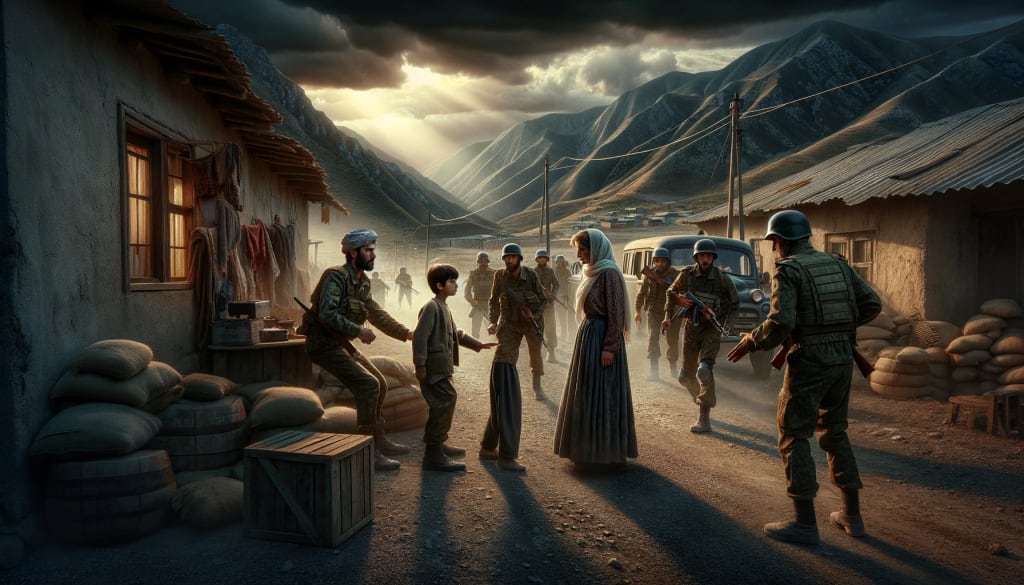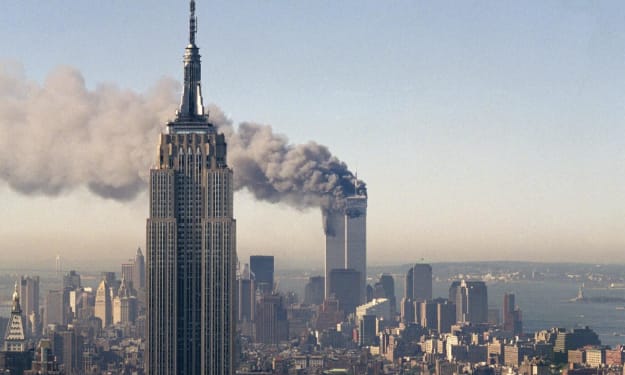True Story :The Untold Saga: Kinship and Struggle in 1980s Iraq
True Events

in the mid-eighties in a woman called Umm Mustafa, a widow with two sons, Mustafa and Hussein. She lived in the city of Zamar, Iraqi Zamar, in the Tal Afar district within the Nineveh province of Iraq. Do not confuse it with another Zamar area in Syria, which belongs to Aleppo province. No, I am talking about Iraqi Zamar in the Nineveh province, near the Tigris River, just a few words away.
To make a long story short, Umm Mustafa faced many problems during the days when there were issues between the government or the regime of the former president Saddam Hussein and the Kurds. You are probably familiar with and have heard about these many problems. In one of those years, there was an economic embargo imposed on them. The Kurds lived in villages, and some of them were semi-displaced and lived even in the mountains. They even had entire villages in the mountains. Around the area where the Kurds lived, there were many checkpoints or security controls that prevented anyone from transporting goods into Kurdish areas.
Due to this situation, and as you know, illegal trade operations always flourish and become profitable during wars and crises. When there is an economic embargo, anything you can export to the embargoed countries will have a highly inflated price, making smuggling operations profitable. Umm Mustafa, being a widow with no source of income or job, and having two young children aged 14 and 13, was like many women living in border areas close to the Kurds. She would smuggle some goods. What she did was pack ghee, oil, seeds, and all the things that could be smuggled into bags, tie them around her waist, and smuggle them to the Kurdish areas.
She would pass through the checkpoints, claiming she was going to visit her relatives. Seeing she had no goods, the guards would let her pass. Umm Mustafa had a charisma; she was tough, could handle conversations, and had strong arguments. When she reached the checkpoints, she knew how to deal with them and would bribe some of the guards with cigarettes, money, or items they lacked. Since they were stationed in the mountains and other areas, there was little supervision over these checkpoints.
So Umm Mustafa would smuggle these goods, take everything she could carry, and smuggle them through the checkpoints. She would go to one of the villages in the mountains, a village inhabited by Kurds, and sell these items. She didn't sell them retail or to individuals; no, she sold them to an elderly Kurdish man who owned a small shop or supermarket. He would buy the goods from her at a high price. For example, if it cost her ten thousand Iraqi dinars, she would sell it for seventy or eighty thousand dinars. He would then sell it for even more. His business relied entirely on Umm Mustafa because although others smuggled goods, none brought them to the same village where Umm Mustafa did. She became his sole supplier, bringing food, cloth, medicines, herbs, and other necessities to the shopkeeper, who then sold them to the villagers.
This situation continued for a long time. As her children grew, Umm Mustafa began teaching them to herd sheep, given that they lived in an area with vast fields and agriculture. Herding was a common occupation there. Her sons worked in herding, and she managed their affairs well. At that time, the Iraq-Iran war made the economic situation very difficult. As her eldest son Mustafa grew older, he said, "Mom, why don't you let me help you with the smuggling instead of tiring myself with herding?" She feared for her children and told him, "No, my son, stick to herding. I will handle the smuggling. I am an old woman; they might take pity on me, but you are a young man. This smuggling is a crime, and they show no mercy to those who break state laws." She kept him away from it.
But Mustafa insisted, saying, "Mom, please let me help." Eventually, she agreed to let him assist her. He would help her carry the goods to the bus station, but she would take responsibility for the goods herself. She hid them under her clothes, and when she approached the checkpoints, she managed to get through them by talking her way through. Sometimes, she had to take different routes to avoid stringent inspections, but she always managed to deliver the goods to the Kurdish village and return home safely.
The first and second times, Mustafa learned how to handle the process. She advised him to carry light items, which he did, such as seeds, herbs, cloth, and cosmetics. On one occasion, she was heading to Abu Maysun with an iron. He asked, "Why don't you bring more desirable items?" She replied, "What do you need, Abu Maysun?" He said, "Bring an iron; we need one in the village, and you can sell it for a good profit." Mustafa started smuggling alone, just like his mother. But they always delivered the goods to Abu Maysun, who relied heavily on them.
One day, Mustafa was caught with an iron by a strict officer. He was arrested and sentenced to six months in prison for violating the economic embargo and smuggling goods. Umm Mustafa was devastated. She cried and pleaded with the authorities to no avail. She stopped smuggling and mourned for her son, who was in prison.
After a couple of months, she considered hiring a lawyer to help her son's case but realized she couldn't afford it. She remembered that Abu Maysun owed her some money for previous deliveries. She decided to make one last smuggling trip to collect the money and hire a lawyer. She managed to reach Abu Maysun after facing strict inspections. He was worried because he hadn't seen her for a while. When she explained her son's situation, he sympathized and offered to help.
Abu Maysun's family took her in for the night, and he promised to give her the money in the morning. During the night, he devised a plan to ensure Umm Mustafa would continue smuggling for him. He proposed that his daughter Maysun marry Mustafa once he was released from prison. Umm Mustafa agreed, relieved that this could solve her problems.
The next morning, Abu Maysun gave her the money. She visited a lawyer who told her that her son's case was straightforward and that there would be an amnesty soon. Indeed, a month later, Mustafa was released from prison. Umm Mustafa was overjoyed and informed him about the marriage proposal. Mustafa was delighted to marry Maysun, and they had a joyful wedding.
Mustafa continued smuggling, becoming more skilled and successful. Abu Maysun's business flourished thanks to Mustafa's efforts. Umm Mustafa grew older and left the smuggling to Mustafa. Over the years, Mustafa became a respected smuggler, expanding his operations and forming strong ties with his cousin Mahmoud.
Mahmoud, however, had family troubles. He had two wives, and the second wife caused conflicts, leading him to disown his son Majid. Majid moved to Kirkuk with his maternal relatives. Mustafa intervened and convinced Mahmoud to reconcile with Majid by proposing a marriage between Majid and Mustafa's daughter, Nawal. The marriage took place, but troubles were far from over.
Nawal became pregnant, and during her labor, her sister Husaynah moved in to help her. Unfortunately, Umm Mustafa passed away, and the family was preoccupied with her mourning. During this time, Husaynah's pregnancy was discovered, and she was accused of being impregnated by Nawal's husband, Majid. In a fit of rage, Husaynah's uncle Hussein killed her to restore the family's honor.
Majid, unaware of the events, fled to Kirkuk to escape retribution. The family demanded justice, and tensions escalated. The authorities intervened, and Majid was sentenced to fifteen years in prison. However, Mustafa and his family were not satisfied, seeking more severe retribution.
Meanwhile, the truth began to unravel. Husaynah's lover, Jawad, confessed while drunk that he was the real father of her child and that his sister Hadiyah had orchestrated the deception to protect him. This revelation led to further confrontations and violence, resulting in the deaths of Hadiyah and Jawad at the hands of their relatives.
In the end, justice was partially served, but the family's suffering and losses were immense. Mustafa's family faced continued strife, and despite attempts at reconciliation, the scars remained.
About the Creator
Enjoyed the story? Support the Creator.
Subscribe for free to receive all their stories in your feed. You could also pledge your support or give them a one-off tip, letting them know you appreciate their work.






Comments
There are no comments for this story
Be the first to respond and start the conversation.